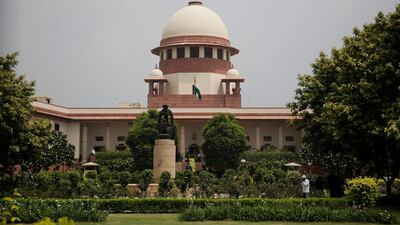India’s Supreme Court has forbidden the caste councils of the country’s villages from interfering in marriages between consenting adults, and has demanded that the government think of ways to protect couples who are harassed by these centuries-old assemblies.
The khap panchayats, as the councils are known across north India where they are most prevalent, are composed of people from a single caste, or sub-caste, or even an extended clan. Through their dominance in the village, they exercise quasi-judicial power and are able to rule upon local affairs and disputes.
Khaps frequently oppose inter-caste or inter-religious marriages, or marriages between two people from the same gotra — a community, in Hinduism, whose members claim to be descended from a single, ancient male ancestor.
These oppositions have sometimes descended into forcibly preventing marriages or into violence and so-called honour killings. Between 2014 and 2016, 356 cases of honour killings — in which one or both partners were murdered — were registered across India, according to government statistics.
“If people decide to marry, and they are adults, you are nobody to interfere,” Dipak Misra, India’s chief justice, said on Monday, in the course of hearing an eight-year-old petition by a human rights non-profit group named Shakti Vahini. The petition seeks to have khaps decreed as unconstitutional and banned.
While the court has yet to decide on the banning of khaps, its order to them to stop meddling in marriages will erode the powers of these councils. The government must also do more, via local police authorities, to protect couples and restrain khaps, the court said.
A ban would make Harsh Malhotra’s life easier. Mr Malhotra is the chief co-ordinator of Love Commandos, a Delhi-based non-profit group that tries to assist couples who want to elude the khaps in their villages.
"We provide them with legal help, protection and shelter, and sometimes even help them get married," Mr Malhotra told The National. "I can assure you there are thousands of people who need assistance to marry whom they want, and many of these are on the run from khaps."
_______________
Read more:
Chennai photographer defies India's fair-skin fetish
Low-caste Hindu leader Kovind sworn in as India's president
Rahul Gandhi nomination highlights India's dynasty politics
_______________
The court's orders are an additional nail in the coffin for the khaps, whose powers have already come under threat from an increasingly liberal India. Women in villages now work in offices, wear jeans and use mobile phones, for instance — all signs of modernity that khaps have opposed.
“Khaps are a societal cancer, and I don’t think it will ever be completely erased,” Mr Malhotra said. “But a ban will definitely help.”
For Sudesh Choudhary, the head of the women’s wing of Satrol Khap, the biggest khap in the state of Haryana, the court’s instructions are erasing old local traditions.
The Satrol Khap encompasses 42 villages near the town of Hisar, where Ms Choudhary lives.
"We do respect the court. They listen to a lot of arguments and make decisions," she told The National. She pointed out that Satrol Khap was one of the more progressive groups in the state. In 2014, the khap decided it would no longer ban marriages between castes — something it had enforced for centuries.
But Ms Choudhary was still opposed to marriages between two members of the same gotra, she said. She called these “consanguineous marriages,” almost akin to a marriage between a brother and a sister, even though the common ancestor of gotra members may be dozens of generations in the past.
“We know what happens when a brother marries a sister,” she said. “Their children have genetic problems. Diseases spread.”
Alok Prasanna Kumar, a senior fellow at the Vidhi Centre for Legal Policy in Bengaluru, pointed out that Indian law already renders genuinely consanguineous marriages void. "What the court was saying was: 'There's a procedure under law, and you can follow that. But you cannot interfere in the marriage.'"
Young people are also “bound to make impulsive decisions”, Ms Choudhary said. “But they should still come to us to talk about them. As the elders of this society, we have experience, and we know this is wrong.”
Khaps ought to be permitted to exercise some of their traditional powers, she said. “After all, this is our culture here, and it has been for centuries. Our culture is eroding. The advance of society doesn’t necessarily mean that we have to stop opposing these marriages.”

